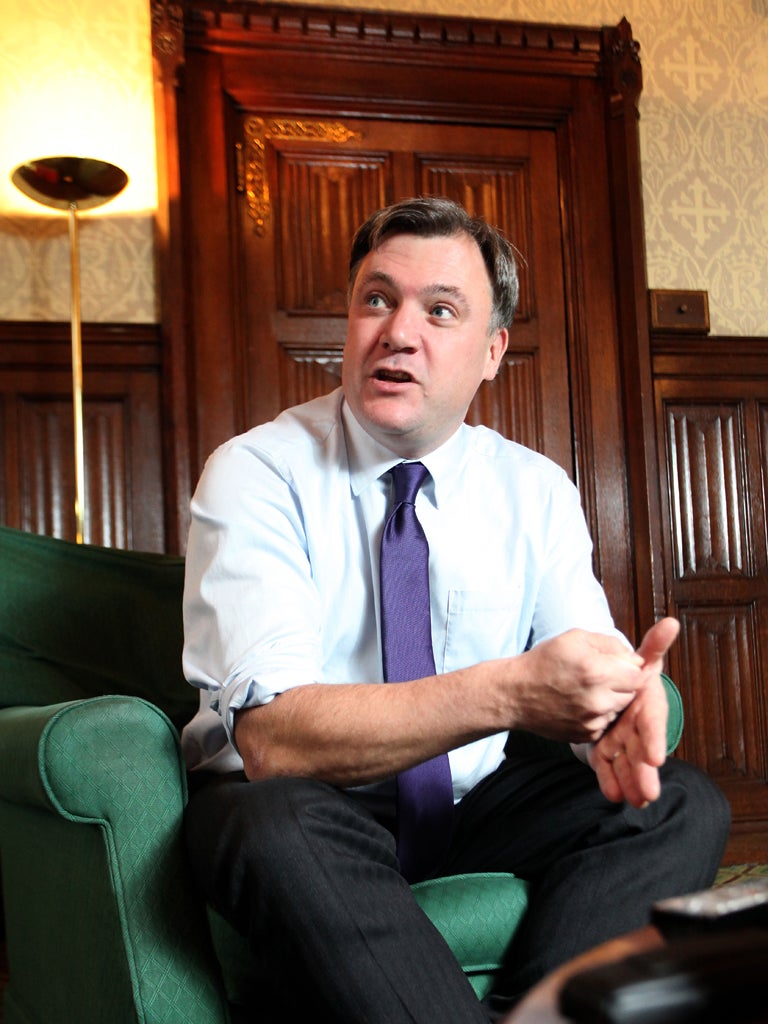Andrew Grice: Balls may be right – but the voters just don't care
Inside Westminster


"I've been waiting to do that response for a year," Ed Balls said after the Chancellor George Osborne confirmed his growth and borrowing targets were way off track in his Autumn Statement in November. "To have a moment when George Osborne had to stand up and say it had gone so wrong, and to have a chance to explain why, was very important for me," Mr Balls told Fabian Review.
His remarks were revealing. All politicians love to be proved right and the pugilistic shadow Chancellor is as keen as most. He was well within his rights: since the Coalition was formed in 2010, he has consistently warned that its spending cuts were "too far, too fast" and would kill the golden goose of growth.
Although a growing number of economists now agree, the voters are in no mood to give Labour credit for anything. Knowing that the public deficit must be cut, people still give the Coalition the benefit of the doubt. The gap Labour needs to close was illustrated by a ComRes poll for The Independent six weeks ago: while 49 per cent of people agree the Government should borrow more in the short term to increase growth – broadly Labour's stance – a much higher 74 per cent agree the top priority should be to pay off the deficit as soon as possible. Only 29 per cent believe that Ed Miliband and Mr Balls would do a better job of sorting out Britain's economic problems than David Cameron and Mr Osborne, while 71 per cent either disagree or do not know.
Some Shadow Cabinet members have been pressing for a new Labour line on the cuts. They fear that, as one put it, Labour "is winning the economic argument but losing the political war". Mr Balls scoffed at that when my colleague Steve Richards and I interviewed him before Christmas. "I have no truck at all with the argument that 'He's right economically, but politically this won't work'. What is the point of being in politics unless you are willing to make the right argument?" he said. Very Ballsy.
There has been no bare-knuckled fight over policy, but I suspect there has been a bit of arm wrestling between Mr Balls and Mr Miliband over Labour's language on the cuts. The Labour leader wants to reassure the public Labour does not, as the Tories damagingly assert, believe "the answer to the debt crisis is to borrow more". It is a crude attack but it chimes with the public and it has worked, as the ComRes figures show. At the same time, Mr Miliband accepts Mr Balls's point that the UK has a growth crisis as well as a debt crisis.
So the Labour leader must perform a delicate balancing act. He does not want to fall into a Tory trap by disowning the previous Labour government for overspending, which would hardly boost his party's economic credentials. He insists the primary cause of the deficit was the global financial crisis, not Labour's spending. Yet he accepts that Labour cannot wish the deficit away and that, if it regained power in 2015, the party would have to finish the job of eliminating it. Mr Miliband does not want to become an echo chamber for the Coalition: if Labour embraced fiscal conservatism without social justice, the voters might well vote for the real thing and the Tories. As one senior Labour source told me yesterday: "The answer is not to become Tory-lite but more radical. A party is defined by the choices it makes in hard times."
Mr Miliband seeks a path different from that both of the previous government and the current one. His plan is to convince the public Labour is serious about paying off the deficit – with measured cuts that do not squeeze the life out of the economy in the way he argues the Coalition has done. He wants to preserve Labour's progressive credentials by implementing the cuts in a different way to the Coalition. He judges the Coalition's claims that "those with the broadest shoulders bear the greatest burden" are not believed by the families in the "squeezed middle", who feel they are paying the price of the cuts and tax rises.
Mr Miliband and Mr Balls will spell out Labour's refined message in important speeches over the next week. Another challenge for them is to distinguish between immediate measures to boost growth – Mr Balls's coveted five-point plan including a temporary cut in VAT – and longer-term measures to wipe out the deficit. The two Eds, I suspect, will argue that having a growth plan does not mean it is "in denial" about the need for a cuts plan, as its opponents claim.
The grumbling about Mr Miliband's performance has continued in what has been an unhappy new year for him. But he remains calm, confident that he is taking Labour down the right road. He admits it is a hard one. As he prepares his offensive on the economy, the stakes for Labour and his own leadership are very high.

Join our commenting forum
Join thought-provoking conversations, follow other Independent readers and see their replies